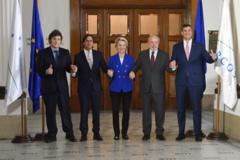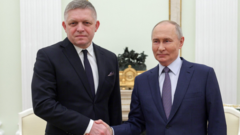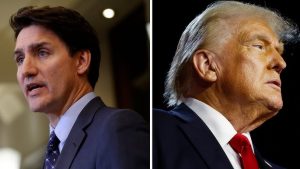In a notable diplomatic effort, the EU and Mercosur countries—Argentina, Brazil, Paraguay, and Uruguay—announced a historic trade deal in Montevideo. European Commission President Ursula von der Leyen hailed the agreement as a "historic milestone," especially in a world rife with confrontations.
EU and Mercosur Reach Historic Trade Accord: Implications and Concerns

EU and Mercosur Reach Historic Trade Accord: Implications and Concerns
The European Union finalized an extensive trade agreement with South America's major economies, marking a significant development in global trade.
The newly forged accord aims to replace a prior agreement from 2019 that was stalled due to insufficient ratification from EU member states. If ratified, the new deal will significantly lower tariffs for companies trading between the two regions, streamline customs procedures, and ensure European access to vital raw materials like lithium and nickel. Von der Leyen asserted during the announcement that this deal would benefit EU citizens, expanding job opportunities and enhancing consumer choices, all while potentially lowering prices.
Statistics from last year underline the importance of this trade relationship, where Europe exported approximately $59 billion worth of goods to the four Mercosur nations, targeting sectors like cars and pharmaceuticals. The corresponding imports from Mercosur amounted to nearly $57 billion, prominently featuring essential minerals and agricultural products.
The trade bond connects about 700 million consumers and could bolster the global economic output by enhancing transcontinental trade flows. Yet, the road to ratification remains challenging, primarily due to the reservations voiced by several EU nations, including France, Italy, and Poland, regarding environmental impacts and competitive inequities in agriculture.
French Trade Minister Sophie Primas clearly indicated dissent on social media, arguing that the Montevideo announcement merely represented a political conclusion to the negotiations, not a binding commitment. She highlighted her intention to align with other member states that share her concerns.
Germany's perspective on the agreement, meanwhile, appears more optimistic, viewing it as a vital opportunity for its exporters, currently facing hurdles due to an economic downturn. Government officials expressed eagerness to resolve French apprehensions to see the deal actualized.
As this landmark trade agreement transitions into a phase of ratification, it stands at the crossroads of international trade dynamics, environmental considerations, and economic strategies within the EU.
The careful navigation of competing interests among EU member states will be essential to ultimately finalize the deal and unlock prospects for enhanced trade relations with South America.
Statistics from last year underline the importance of this trade relationship, where Europe exported approximately $59 billion worth of goods to the four Mercosur nations, targeting sectors like cars and pharmaceuticals. The corresponding imports from Mercosur amounted to nearly $57 billion, prominently featuring essential minerals and agricultural products.
The trade bond connects about 700 million consumers and could bolster the global economic output by enhancing transcontinental trade flows. Yet, the road to ratification remains challenging, primarily due to the reservations voiced by several EU nations, including France, Italy, and Poland, regarding environmental impacts and competitive inequities in agriculture.
French Trade Minister Sophie Primas clearly indicated dissent on social media, arguing that the Montevideo announcement merely represented a political conclusion to the negotiations, not a binding commitment. She highlighted her intention to align with other member states that share her concerns.
Germany's perspective on the agreement, meanwhile, appears more optimistic, viewing it as a vital opportunity for its exporters, currently facing hurdles due to an economic downturn. Government officials expressed eagerness to resolve French apprehensions to see the deal actualized.
As this landmark trade agreement transitions into a phase of ratification, it stands at the crossroads of international trade dynamics, environmental considerations, and economic strategies within the EU.
The careful navigation of competing interests among EU member states will be essential to ultimately finalize the deal and unlock prospects for enhanced trade relations with South America.




















